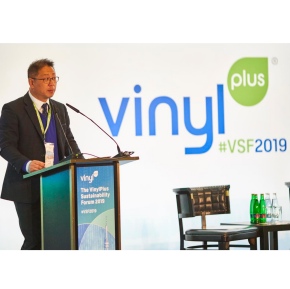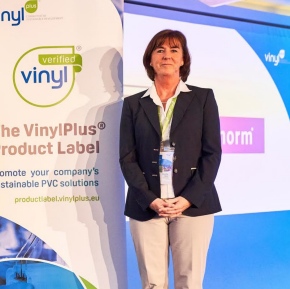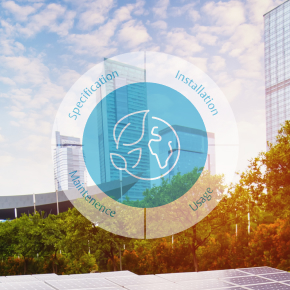
VinylPlus announced recycling of almost 740,000 tonnes of PVC in 2018
VinylPlus® was pleased to announce at the VinylPlus Sustainability Forum, that in 2018, it recycled a total of 739,525 tonnes of PVC within its framework.
VinylPlus is the Voluntary Commitment of the European PVC industry. The programme establishes a long-term framework for the sustainable development of the PVC industry by tackling a number of critical challenges in the EU-28, Norway and Switzerland. Last year’s total of 739,525 tonnes is a fantastic 15.6% increase on the previous year.
The results were presented at the 2019 edition of the VinylPlus Sustainability Forum in Prague earlier this month, where the industry shared further progress towards increasing the sustainability performance of PVC. This year’s theme ‘Accelerating Innovation’ examined the challenges and opportunities presented by new technologies in shaping the PVC sector’s future in the context of the circular economy.
Presentations and panel discussions by top-level experts revolved around the three sustainability pillars – economic, social and environmental – and how innovation is impacting the PVC industry and its journey to sustainable development.
 Despite regulatory constraints, VinylPlus General Manager Brigitte Dero announced that the PVC industry recycled an all-time high of nearly 740,000 tonnes – 92.4% of the VinylPlus’ 2020 target. Recovinyl remains the main contributor, registering 734,568 tonnes of recycled PVC. Cumulatively, almost 5 million tonnes of PVC have been recycled since 2000.
Despite regulatory constraints, VinylPlus General Manager Brigitte Dero announced that the PVC industry recycled an all-time high of nearly 740,000 tonnes – 92.4% of the VinylPlus’ 2020 target. Recovinyl remains the main contributor, registering 734,568 tonnes of recycled PVC. Cumulatively, almost 5 million tonnes of PVC have been recycled since 2000.
The Forum was opened by the Czech Minister of Environment, Richard Brabec, who emphasised the need for the sustainable management of plastics in the context of the circular economy. He called for an uptake of both recycling and the demand for recycled products.
Welcoming delegates, VinylPlus Chairman Stefan Sommer emphasised that a “balanced and harmonised legislative framework for the recycling of plastics is essential to secure our contribution to the circular economy and to achieve our new recycling target of at least 900,000 tonnes by 2025.” This would be in line with the European Commission’s objective of 10 million tonnes for the plastics industry, underlining VinylPlus’ continuous engagement with regulators and institutions.
Member of European Parliament Martina Dlabajová explored the industry’s role in the evolution of society and education needs. With the environment such an important topic dominating the political agenda at the moment, she explained that VinylPlus was an ideal example of a voluntary commitment to sustainable development. “Only through cooperation with businesses and industry can politicians make informed decisions,” she explained.
Following her, Fulvia Raffaelli, Head of Unit at DG GROW, European Commission, highlighted how the construction sector is adapting to digital times. Fulvia said: “Construction is often perceived as a conservative sector, but it’s not. It’s very innovative and digitalisation can really help to drive innovation in the direction of sustainability. That’s where we need to focus; to drive digitalisation in this sector to achieve sustainability objectives across the lifecycle approach, from the design phase to the use and recycling at the end of life.”
Then, in a presentation on Environmental Standards and Certifications through an NGO lens, Jenny Walther-Thoss, Policy Officer of Sustainable Biomass and Sustainable Certification at World Wide Fund (WWF), stressed that products need to fit a more holistic approach to the circular economy through more efficient production methods and a focus on the longevity of the product. When discussing certification systems, she placed the emphasis on the need to deliver impact and value, however, recognised that finding that balance is a difficult issue to solve.
In an award ceremony, a further four profile manufacturers – Deceuninck, Finstral, Salamander Industrie Produkte and Internorm – were awarded the VinylPlus® Product Label. Based on sustainability criteria, including responsible sourcing and additives, the VinylPlus® Product Label is open to all PVC building and construction products.
Dr. Jo Dewulf, Professor of bioscience engineering at Ghent University (Belgium) and new Chairman of the VinylPlus Monitoring Committee, delivered a keynote on Sustainability as a Key Driver for Innovations in the Plastics Industry and reflected on the impact of innovation for the future of the PVC industry.
Closing the forum, Arab Hoballah, Team Leader at EU-SWITCH-Asia Sustainable Consumption and Production Facility (SCP) and Ex-Chief SCP for the United Nations Environment Programme (UNEP) emphasised how ‘eco-innovation’ could help to address the sustainability challenges faced by the PVC industry. He said: “This requires mainstreaming sustainability with a lifecycle approach throughout all business operations and creating novel solutions to meet market demand. We cannot live without plastic, so let us talk about the ‘good’ ones properly.”
Reflecting on the Forum, Brigitte Dero concluded: “For almost 20 years, VinylPlus has led the way towards a circular economy by improving the sustainability performance of PVC. By forging ever-greater collaborations and partnerships in pursuit of our sustainability goals, we will take our industry voluntary commitment to ever greater heights.”
Latest news

19th April 2024
ASSA ABLOY: Access solutions can impact sustainability performance across the full life-cycle of a building
Embedding sustainability within any organisation requires a broad, strategic perspective. Scrutiny should include the physical infrastructure itself: According to the IEA, buildings consume around 30% of global energy*. ASSA ABLOY has more…
Posted in Access Control & Door Entry Systems, Architectural Ironmongery, Articles, Building Industry News, Building Products & Structures, Building Regulations & Accreditations, Building Services, Case Studies, Doors, Facility Management & Building Services, Information Technology, Research & Materials Testing, Retrofit & Renovation, Security and Fire Protection, Sustainability & Energy Efficiency, Video of the Week
19th April 2024
British weather doesn't dampen spirit for new HMG Garden Paint
Despite one of the wettest starts to the year on record, customers are starting to plan for brighter days with HydroPro Garden Paint from HMG Paints.
Posted in Articles, Building Industry News, Building Products & Structures, Garden, Innovations & New Products, Paints, Paints, Coatings & Finishes, Restoration & Refurbishment, Retrofit & Renovation, Site Preparation, Sustainability & Energy Efficiency, Waste Management & Recycling
18th April 2024
Abloy UK showcases new digital portfolio at The Security Event 2024
Abloy UK is set to unveil its latest line-up of access control systems at The Security Event 2024, welcoming guests to explore its cutting-edge electromechanical and digital solutions on stand 5/F50.
Posted in Access Control & Door Entry Systems, Architectural Ironmongery, Articles, Building Industry Events, Building Industry News, Building Products & Structures, Building Services, Doors, Exhibitions and Conferences, Facility Management & Building Services, Health & Safety, Information Technology, Retrofit & Renovation, Security and Fire Protection
18th April 2024
Strand is a Failsafe Choice for Emergency Exit and Panic Hardware
In times of emergency, you’re in safe hands with Strand Hardware. Although there are many considerations for building specification, few decisions can be as critical as selecting the right emergency exit/panic hardware.
Posted in Access Control & Door Entry Systems, Architectural Ironmongery, Articles, Building Industry News, Building Products & Structures, Building Services, Doors, Facility Management & Building Services, Health & Safety, Restoration & Refurbishment, Retrofit & Renovation, Security and Fire Protection
 Sign up:
Sign up: